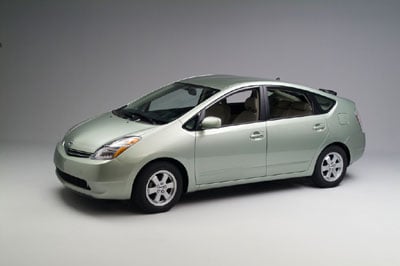Petrol-Electric Hybrid Cars Are Just Ridiculous: I move onto an issue which is more in line with most people's normal lives. The hybrid car is one of those new technologies which various car manufacturers are trying to push forward. In this age of ever-decreasing petrol reserves, any sort of efficient alternative to the reciprocating petrol engine would be a step in the right direction. Whatever the alternative happens to be, though, I doubt it's going to be the petrol-electric hybrid.
My feelings towards the petrol-electric hybrid is that it's a marketing exercise, a way to make people feel better about the planet without actually having to do anything. The problem is that it doesn't work that way. The petrol-electric car isn't particularly more efficient than its petrol alternatives, and is, when practical tests of efficiency are used, often less efficient than an equivalent diesel engine.
A petrol-electric hybrid works on simple principles. Along with a standard, albeit usually low-power, reciprocating petrol engine, it has a secondary electric motor, which propels the car at low speeds, with the petrol engine taking over at higher speeds. The electric system is usually recharged by regenerative braking, a way to convert the kinetic energy of a car into electrical energy, or, when the batteries run out of power, by an alternator powered by the petrol engine.
Such a system is very complex, and with complexity comes weight. Weight, as anyone who remembers the first point will have realised, is one of the enemies of car design, particularly when it comes to speed. So, hybrid cars aren't particularly quick, but then, when you're driving a car like a hybrid, I don't suppose that speed is your main objective. But weight also leads to lower fuel economy, which means at high speeds where the electric engine is unable to keep up, it's at a decided disadvantage versus more conventional cars.
So, let's take a closer look at the fuel economy of the hybrid. A car like the Toyota Prius gets a fuel economy of about 65mpg (imperial), according to official UK statistics. That's pretty good, actually, but it would be a lot more impressive if the Volkswagen Polo Bluemotion (a diesel) didn't get figures more akin to 80mpg. The official statistics don't tell the full story either - according to more practical tests by What Car? Magazine in the UK, the Toyota Prius can only get about 50mpg when driven in a normal fashion, which starts to put it down near a series of more powerful and larger diesel engines, let alone the Polo Bluemotion, which could probably call upon a 70-75mpg fuel economy with practical use.
Actually, petrol-electric cars aren't particularly good for the environment either. Because the Toyota Prius has components sourced from all around the world, and isn't even built in the American or European factories, they have to ship the cars around the world, probably causing more emissions than they'll ever save by virtue of their hybrid engines.
Helping to kill polar bears, one misguided fool at a time.
Then, there's those batteries. They've got a limited lifespan, somewhere on the region of eight years. This doesn't hold up well compared to conventional cars. European and Japanese cars in Europe often last for more than a decade, with my own car being twelve years old. Certain collector's sports cars, particularly a car like the MG B, could last much longer. Many of them are now thirty or more years old. Because it's not cost-effective to replace the batteries in an eight-year-old hybrid, the whole car will be scrapped, and it is for that reason that a Toyota Prius is considered to be more damaging to the environment over its lifetime than a Land Rover Discovery.
"But my favourite celebrity drives a Toyota Prius," you might say. Well, obviously, there's a problem with that sort of reasoning. When it comes to matters of automobiles, celebrities are more often than not very ignorant as to how a car works. Go and ask somebody like Leonardo di Caprio how a catalytic converter or a gearbox works.
Well, maybe you'll have a hard time getting in contact with him. Now, there are celebrities who know a lot about cars, people like Jay Leno and Rowan Atkinson, and a few very talented racers in the set, including the late Steve McQueen and Paul Newman. Do you know what sorts of cars they drive? Big V8 or V12 supercars, not pokey little milk floats with stupid hybrid engines. The fact that so many celebrities seem to be driving cars like the Prius and the horrible, abominable, disgusting REVA G-Wiz is precisely because they want to be looked at as having done something to save the planet without actually having to realise that they'd have done a lot more by buying a diesel.
At this point, it might look as I've completely shrugged off the hybrid as a possibility altogether, but surprisingly, I haven't. There is still one hybrid technology that I think might have some practical benefits, and I'm surprised that it wasn't developed sooner. All you have to do is replace the petrol engine with a diesel engine, and you get the diesel-electric hybrid. It's more difficult to produce, but suddenly, the fuel economy goes from 65mpg to somewhere over 100mpg. That sounds a lot better, doesn't it?
(Currently, Vauxhall are looking at a concept for a diesel-electric hybrid that can theoretically get 170mpg, but of course, being attached to General Motors doesn't help the chances of that technology being developed any time soon.)

